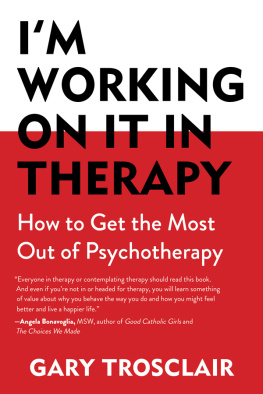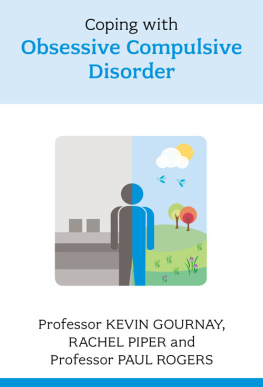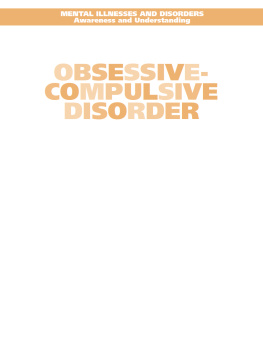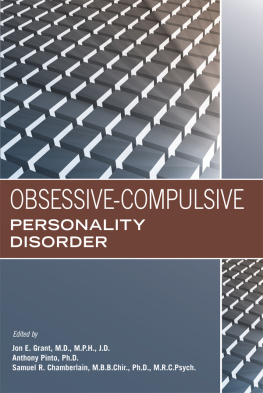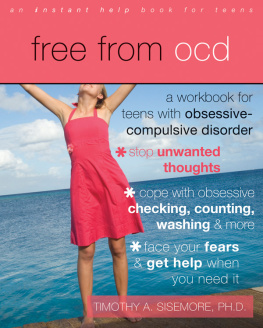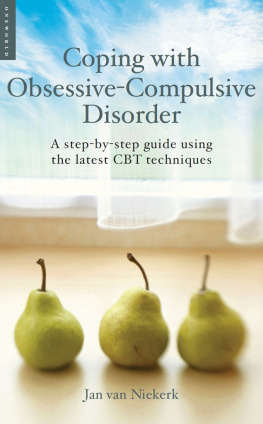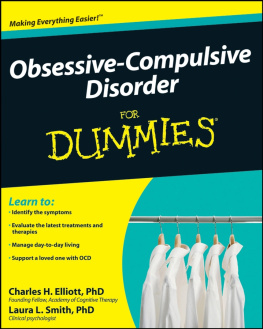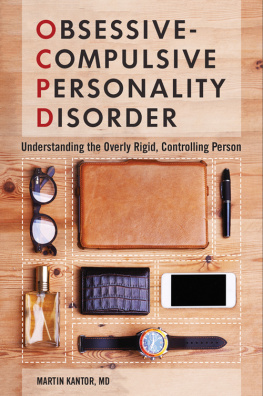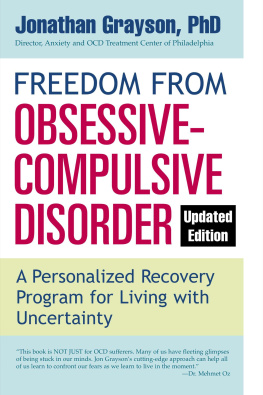Gary Trosclair, DMA, LCSW, is a psychotherapist and Jungian analyst in private practice in New York City and Westchester County, New York. He is president of the New York Association for Analytical Psychology and serves on the faculty of the Jung Institute of New York, the Jung Foundation of New York, and the New York Center for Jungian Studies. He is the author of Im Working on It in Therapy: How to Get the Most Out of Psychotherapy and of the blog The Healthy Compulsive Project. He lives in Tuckahoe, New York, with his wife and two daughters.

Many friends and colleagues have generously given their time, suggestions, and support in the years that this book has taken shape. Thanks to Michael Dowling, Nancy Eisenman, Kathryn Staley, and Nancy Ulrich for reading early drafts of the book and giving encouragement and feedback. My time with Charles Salzberg and the New York Writers Workshop was indispensable in shaping the book and its tone. Thanks to Steve Harris at CSG Literary Partners for finding a home for The Healthy Compulsive and for helping me navigate the world of publishing, and to Suzanne Staszak-Silva at Rowman & Littlefield for seeing the potential in the book and her patient and encouraging assistance in the final stages. Production editors Andrew Unger and Lisa Whittington saved me from many literary and scholarly embarrassments. Janet Care-swell and Gerry Compas at The C. G. Jung Foundation of New York provided support for my first book and gave me a platform to present and develop my thinking. Lorna Peachin at the Kristine Mann Library has provided friendly and knowledgeable help in research. Thanks also to all of my colleagues at the New York Association for Analytical Psychology and the C. G. Jung Institute of New York for their support and confidence.
The ten thousand (and counting) interactions with friends at the Cedar Knolls Zen Sangha and the First Unitarian Society of Westchester have helped me stay sane and inspired me to walk consciously, communally, and joyfully on this precious Earth.
Once again, thanks to Nancy, Zoe, and Thea for their love and patience, and for reminding me of whats most important. But most of all for simply being who they are.
Looking Back
Its been four years since I began working on this book. Writing it has forced me to look at my own behavior and attitudes; Ive tried to always ask myself if what I was writing was actually true in my own experience, not just according to research or clinical theory. Its been humbling to see the persistence of my patterns, but encouraging to note that I am able, with time and work, to make conscious choices to use my energy in healthy ways. I cant be objective about my own growth, but I do believe that becoming more aware of my driven nature has helped me to indulge it less and to use it more.
Its been more than twenty-five years since I began working as a therapist. Ive observed that we each have our own individual religion. Im not necessarily referring to formal creeds, denominations, stone buildings, and rituals. Rather Im referring to a personal sense of what holds the greatest meaning for us, what we depend on, and what we prioritize, whether its money, success, status, sex, alcohol, partners, contributing to the greater good, family, or personal growth. Most people dont consciously decide and articulate their religion, and thats part of the problem. They tend to live according to these values automatically, without reflecting on them. But choosing and embracing truly gratifying sources of meaning consciously is necessary to live on the healthy end of the compulsive spectrum.
A related observation from my clinical experience is about what helps us to move toward that healthy end of the spectrum. The transformation is subtle, and often neither the therapist nor the patient is aware of it. But if you step back and look at the big picture of what has transpired, you can usually see that whats happened is that a faith in the process of growth has been awakened or renewed. A sense of hope, momentum, and direction emerges that helps us to navigate and steer. Weve not only taken the wheel of our car and gotten a clearer sense of where were going; weve also found meaning and inspiration in the fact that were moving forward.
As Ive thought about this issue for the last few years, Ive often questioned whether I was being overly optimistic. My patients, however, have often unwittingly confirmed the important role of psychological momentum, inspiring the work that I do every day. Many of them have shown me that growing forward is what gave them the secure base from which to keep working when life became particularly difficult.
As one patient who was learning to live in a more balanced way explained to me, Its a lot like riding a bicycle: keeping your balance is much easier when youre moving forward.
For people who are driven, becoming healthy often requires a shift of attitude, one in which we value the development of personal traits alongside those of external achievements. While using our energy to find our place in the outer world is necessary and can be fulfilling, turning that energy toward the Inner Game, in the long run, is the more satisfying and healing project. When we turn our energies to the balanced development of the personality and an orientation to inner momentum, other goals are put into their appropriate place and into their proper perspective.
Its been more than forty years since my initial fascination with psychology and spirituality first sparked my interest in knowing myself. Discoveries have continued to come since the early realizations about the Inner Game, and Self 1 and Self 2 that I mentioned in the preface. But those early themes have stayed with me: Who is this Self 2 who can help me play the Inner Game? Who or what is it inside of me that drives me? What can I learn from it? What is this drive for?
The Role of Healthy Compulsion in the Larger World
There is a reason that some of us are compulsive. Nature wants to grow and expand so that it can adapt and thrive, and it needs different sorts of people to do that. Including compulsives.
Joseph Campbell, the great twentieth-century mythologist, outlined the course of the Heros Journey: leave home, venture into the underworld where you confront your demons, and thenand too often this is left outthen return to your village to share the boon that you discovered.
This is why advocating the Inner Game is not a selfish approach to life, rather that we discover and develop who we are so that we can be more fulfilled and be of service to our community. As all people do, no matter what their personality type, people who are driven have an important place in the world. We tend to make things happenfor better or worse. We are catalysts. Nature has given us this drive; how will we use it? Finding that role and living it consciously solves the riddle I raised in the introduction: what are these compulsive urges for? Finding and living our unique, individual role, no matter how small or insignificant it seems, is the most healing action we can take.
However, we can only determine that role to a limited degree. When Self 1 doesnt accept this, we become unhealthy.
Sharing the Reins
Ive often wondered if the subtitle and metaphor for this book, Taking the Wheel of the Driven Personality, would mislead my readers. Its really about sharing controlnot taking it.
Taking the wheel is a modern version of the ancient archetypal image of the charioteer taking the reins of his chariot. He looks heroic and determined. In control. In fact, Carl Jung said that he would never want to be a charioteer because hed rather not be in controlhe preferred the creativity that Self 2, the unconscious, has to offer to the certainty that Self 1, the ego, offers.


